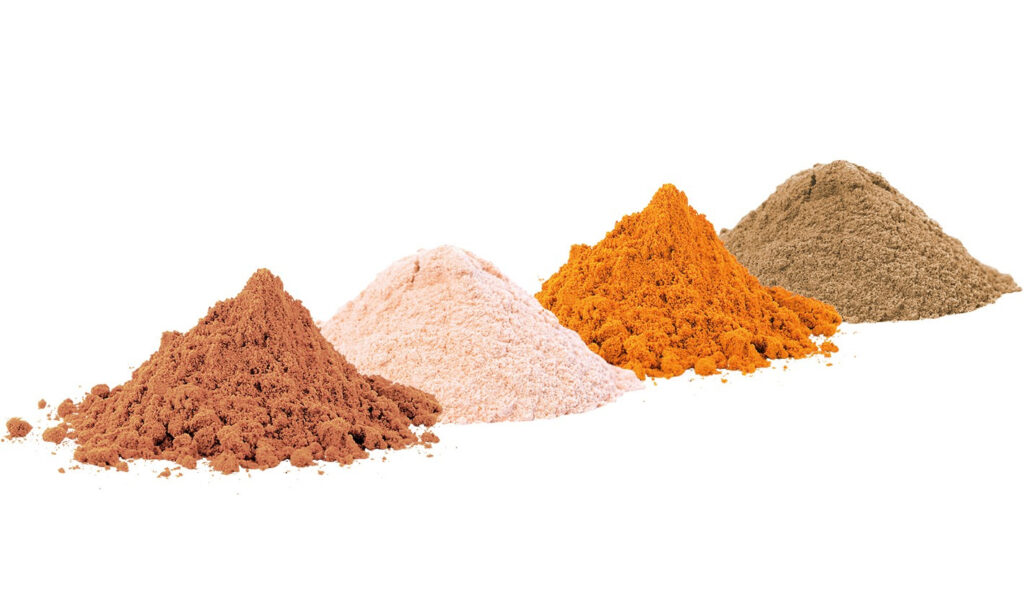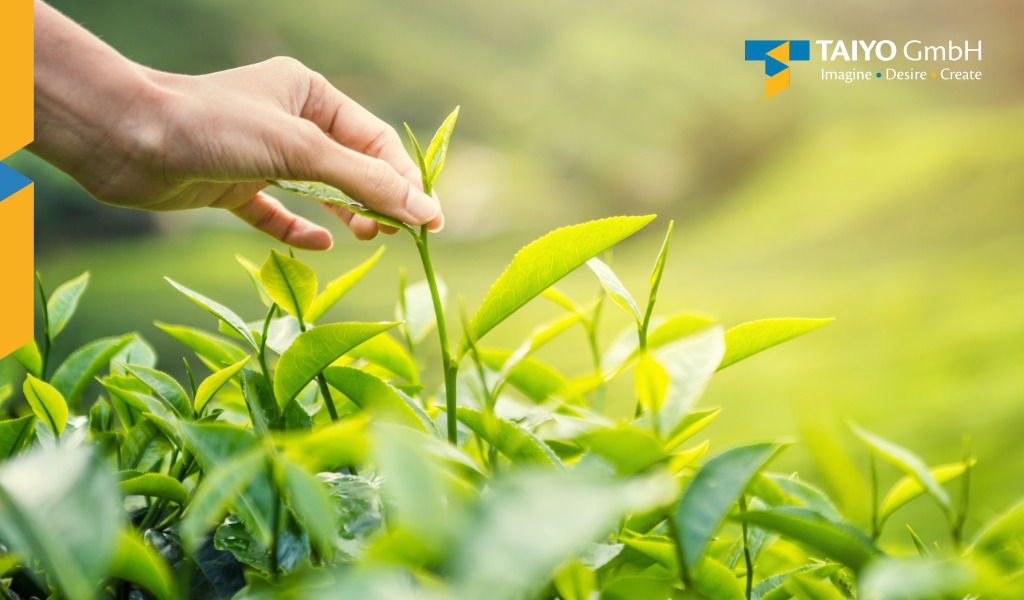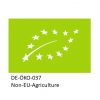Green tea extracts inactivate coronavirus? It has long been known that the secondary plant compounds in green tea extracts act like natural antibodies. Furthermore, the anticarcinogenic, cardioprotective, neuroprotective, antimicrobial and antiviral effects of daily green tea consumption have been demonstrated in numerous studies.
For example, it’s known that green tea catechins are effective against many viruses that affect human health, such as hepatitis, herpes simplex, HIV, Zika and a wide range of coronaviruses such as influenza. Furthermore, latest studies and laboratory experiments have now demonstrated that green tea extracts can also affect the SARS-CoV-2 coronavirus.
At the end of 2020, three different studies independently tested whether green tea catechins were effective against the new human SARS-CoV-2 virus.
Frank and Conzelmann, CogniVerde
A German study showed that green tea infusions and juices such as elderberry or pomegranate were able to reduce the viral infectivity of influenza and SARS-CoV-2 virus titers in vitro (Frank et al. 2020). The results demonstrated that the green tea infusions were able to reduce both the influenza virus titer and, albeit to a much lesser degree, the SARS-CoV-2 virus titer. The reason for this could be the strongly different and varying content of catechins and polyphenols in the different tea infusions.
Yano, Nara University
Independently, laboratory experiments at Japan’s Nara Medical University also demonstrated that green tea extracts are effective against the SARS-CoV-2 coronavirus. Professor Hisakazu Yano and his team from the Department of Microbiology and Infectious Diseases confirmed the inactivation of the new SARS-CoV-2 coronavirus by tea (Yano 2020). Using ten different varieties of commercially available tea, sold in plastic bottles, the virus was mixed with a sample of each one and subsequently monitored for viability and/or growth. Pursuant to Dr Yano’s theory that tea could be used to detoxify the virus in humans, it was noteworthy that the teas were able to reduce the toxicity of the virus by 99% and 99.9% in one and 10 minutes, respectively.
Taiyo Kagaku
Based on Frank et al.’s and Yano’s findings, Taiyo Kagaku Japan performed an in-house in vitro dose response study to verify their results by using a highly potent green tea extract with a known and defined quantity of catechins. For the study, human fetal lung fibroblasts were mixed with active coronaviruses and green tea catechins before the solution was cultured at 37 °C for 96 hours to evaluate virus-derived cytotoxicity. As a result, the viruses were inactivated. The scientists used 62.5 ppm of a specific Sunphenon® green tea extract and found that even this quite low concentration of catechins was able to inactivate the SARS-CoV-2 virus in vitro and could reduce the cytotoxicity of the SARS-CoV-2 virus by 99.99%.
The effect may be attributable to the polyphenols in the tea, which are known to be able to bind to the spike proteins of the coronavirus (or corresponding receptors) and disable the mechanism that viruses use to attach themselves to cell walls. This is an essential step that enables viruses to invade and infect human cells. By being able to prevent this process, it is therefore concluded that green tea catechins have both anti-adhesion and anti-invasion properties.
As experimental studies have revealed that green tea prevents influenza infection in students (Ide et al. 2014) and hospital staff (Matsumoto et al. 2011), these results may suggest a protective effect against viral entry and, consequently, coronavirus infection. However, although these results that green tea extracts inactivate coronavirus are very encouraging, additional work is needed to confirm the findings. It remains undisputed that the most effective defense strategy consists of vaccination and compliance with the rules for reducing contact and hygiene (distance, hand washing, wearing mask). However, supporting the immune system by the consumption of green tea can serve as a further and advantageous measure.
Shedding light on polyphenols and catechins
The antiviral role of green tea catechins, which have a strong antioxidant effect and scavenge free radicals, has been much studied, particularly regarding herpes simplex virus type 1 (Colpitts and Schang 2014), hepatitis C virus (Calland et al. 2012) and Zika Virus (Carneiro et al. 2016).
It has been shown that gargling with green tea reduces the incidence of influenza by up to 60%. Influenza viruses thrive in the lower respiratory tract, which makes them difficult to reach and treat. Because the SARS-CoV-2 virus infects the upper respiratory tract, it is more infectious than influenza; but, by contrast, it is more accessible and easier to treat by gargling. It was also demonstrated that many oral care mouthwashes can reduce SARS-CoV-2 incidence. However, many of these products comprise chemicals that should not be swallowed and are impractical for on-the-go use.
Therefore, Taiyo developed a drinkable oral care mouthwash concept that contains an effective dose of highly potent and anti-viral green tea extracts. The idea is that when a consumer enters an area (bus, train or supermarket, for example) that presents a SARS-CoV-2 risk, they can squirt the spray-based mouthwash into their mouth and hold it there to offer protection against virus particles that might pass through their mask. The spray is a food product and is safe for human consumption. Offering even more benefits, it also kills the bacteria that cause dental caries and bad breath.
Content and origin are crucial
Because the polyphenol content of commercially available green tea extracts varies considerably, depending on their origin, quality is important. Taiyo’s tea extract, as used in the study, comes from known sources and is produced in its own factory according to the most stringent quality standards (FDA guideline 40CFR180).

What’s more, these high purity extracts of whole tea leaves are the basis of Sunphenon® polyphenols, which are guaranteed to be free from solvents, pesticides and other residues. Each kilogram of finely ground leaves is brewed using a special pure-water infusion process. With a polyphenol content of up to 80%, 75% catechins and 40% epigallocatechin gallate (EGCG), which is also considered to be an important constituent and has shown both anti-aging and cardioprotective potential in experiments, Sunphenon® could play an important role in immune health. Combined, these benefits make Sunphenon® green tea extracts the perfect product for elderly people who suffer most from many of these age-related problems.

If you are interested in the studies about “Green tea extracts inactivate coronavirus” and other studies on the effects of green tea, or would like to know more about Sunphenon® tea extracts and our oral care mouthwash concept, please feel free to contact us.
References:
Calland, Noémie; Albecka, Anna; Belouzard, Sandrine; Wychowski, Czeslaw; Duverlie, Gilles; Descamps, Véronique et al. (2012): (-)-Epigallocatechin-3-gallate is a new inhibitor of hepatitis C virus entry. In: Hepatology (Baltimore, Md.) 55 (3), S. 720–729. DOI: 10.1002/hep.24803.
Carneiro, Bruno M.; Batista, Mariana N.; Braga, Ana Cláudia S.; Nogueira, Maurício L.; Rahal, Paula (2016): The green tea molecule EGCG inhibits Zika virus entry. In: Virology 496, S. 215–218. DOI: 10.1016/j.virol.2016.06.012.
Colpitts, Che C.; Schang, Luis M. (2014): A small molecule inhibits virion attachment to heparan sulfate- or sialic acid-containing glycans. In: Journal of virology 88 (14), S. 7806–7817. DOI: 10.1128/JVI.00896-14 .
Ide, Kazuki; Yamada, Hiroshi; Matsushita, Kumi; Ito, Miki; Nojiri, Kei; Toyoizumi, Kiichiro et al. (2014): Effects of green tea gargling on the prevention of influenza infection in high school students: a randomized controlled study. In: PloS one 9 (5), e96373. DOI: 10.1371/journal.pone.0096373 .
Matsumoto, Keiji; Yamada, Hiroshi; Takuma, Norikata; Niino, Hitoshi; Sagesaka, Yuko M. (2011): Effects of green tea catechins and theanine on preventing influenza infection among healthcare workers: a randomized controlled trial. In: BMC complementary and alternative medicine 11, S. 15. DOI: 10.1186/1472-6882-11-15 .
Picture sources: Shutterstock | NATNN; Taiyo






